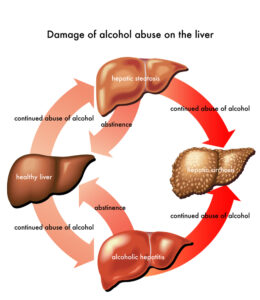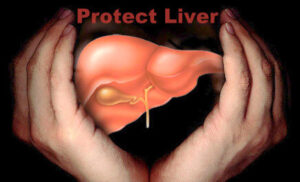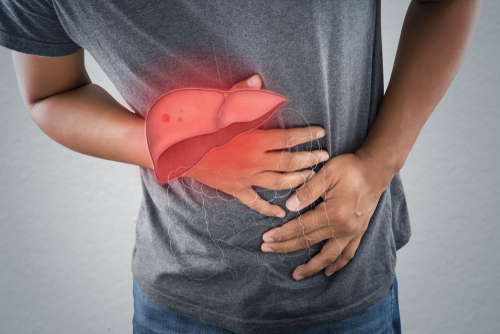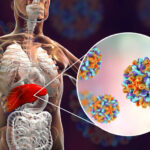Facts about Alcoholic Hepatitis
Alcoholic hepatitis is a severe liver disease caused by excessive alcohol consumption. The condition is marked by inflammation and damage to the liver, which can lead to liver failure if left untreated.
In this article, we’ll explore the causes, symptoms, diagnosis, treatment, and prevention of alcoholic hepatitis.
Causes
This disease is caused by excessive alcohol consumption over a prolonged period. Alcohol is toxic to the liver and can cause inflammation and damage to liver cells, leading to alcoholic hepatitis.
The risk of developing alcoholic hepatitis is higher in heavy drinkers and people who have been drinking for a long time.
Symptoms
The symptoms of alcoholic hepatitis can vary in severity and may include:
- Abdominal pain and discomfort
- Jaundice (yellowing of the skin and eyes)
- Nausea and vomiting
- Loss of appetite
- Fatigue and weakness
- Swelling in the legs and abdomen
- Confusion and difficulty thinking clearly
Diagnosis
Diagnosis of alcoholic hepatitis begins with a physical exam and medical history review. Blood tests can be done to check liver function and detect elevated liver enzymes, indicating liver damage.
Imaging tests, such as ultrasound or CT scans, may be ordered to assess the extent of liver damage.
In some cases, a liver biopsy may be required to confirm the diagnosis and determine the severity of the condition.
Treatment

The primary treatment for alcoholic hepatitis is to stop drinking alcohol. This is critical in preventing further liver damage and allowing the liver to heal.
In severe cases, hospitalization may be required for supportive care, including fluid and electrolyte replacement, nutrition support, and treatment for complications such as infections.
Corticosteroids may be prescribed to reduce inflammation and improve liver function in some cases.
Other medications, such as pentoxifylline, may be used to reduce inflammation and improve liver function. Liver transplantation may be considered in severe cases of liver failure.
Prevention of Alcoholic Hepatitis
Preventing alcoholic hepatitis involves avoiding excessive alcohol consumption. Here are some tips for preventing the disease:
Limit alcohol consumption: The recommended daily limit of alcohol is one drink for women and two drinks for men. Drinking in moderation is essential in preventing this disease.
Seek help for alcohol addiction: If you’re struggling with alcohol addiction, seek help from a healthcare provider or addiction specialist. Treatment for alcohol addiction can help prevent alcoholic hepatitis and other health complications.
Maintain a healthy diet: A balanced diet can help reduce the risk of developing alcoholic hepatitis. Eating a diet rich in fruits, vegetables, whole grains, and lean protein sources can improve liver health and prevent liver damage.
This disease is a condition that can develop gradually over time or suddenly appear as a severe and life-threatening illness. The severity of alcoholic hepatitis can range from mild to severe, and in some cases, it can progress to liver failure and death.
AH is most commonly seen in people who have been heavy drinkers for many years. However, not everyone who drinks heavily will develop alcoholic hepatitis, and the disease can also occur in people who consume moderate amounts of alcohol.
One of the most significant risk factors for developing alcoholic hepatitis is binge drinking. Binge drinking is defined as consuming a large amount of alcohol in a short period, typically within two hours. Binge drinking can cause severe damage to the liver, leading to inflammation, scarring, and even liver failure.
The symptoms of AH can be similar to those of other liver diseases, making diagnosis challenging. In some cases, there may be no symptoms at all. Early detection and treatment are critical in preventing the disease from progressing to more severe stages.
Treatment for alcoholic hepatitis typically involves stopping alcohol consumption, which is essential for preventing further damage to the liver. Abstinence from alcohol can also improve liver function and allow the liver to heal.
In addition to stopping alcohol consumption, people with this disease may need additional treatment, such as medications to reduce inflammation and improve liver function.

In severe cases, hospitalization may be required for supportive care, including fluid and electrolyte replacement, nutrition support, and treatment for complications such as infections.
Liver transplantation may be considered in severe cases of alcoholic hepatitis that have progressed to liver failure.
However, transplantation is not always an option, and the decision to undergo transplantation is complex and requires careful consideration.
Preventing this disease involves avoiding excessive alcohol consumption, seeking help for alcohol addiction, and maintaining a healthy lifestyle. Eating a balanced diet, exercising regularly, and avoiding harmful substances, such as drugs and tobacco, can also help reduce the risk of developing liver disease.
Alcoholic hepatitis is a severe liver disease caused by excessive alcohol consumption. Understanding the causes, symptoms, diagnosis, treatment, and prevention is crucial in maintaining liver health.
If you suspect you may have this disease, consult with your doctor for diagnosis and treatment options. By making healthy lifestyle choices and seeking help for alcohol addiction, you can reduce your risk of developing the disease and improve your overall health and well-being.
In conclusion, alcoholic hepatitis is a serious condition that can have severe consequences if left untreated. Understanding the risk factors, symptoms, and treatment options is essential in maintaining liver health and preventing liver damage.
If you suspect you may have this disease or are struggling with alcohol addiction, consult with your doctor for diagnosis and treatment options.
Impact of Sexually Transmitted Diseases

A graduate of Computer Science and Information Management Technology. Diploma – Caregiving, Certificates – Dementia and Diabetes Awareness and Management. A researcher, blogger, songwriter, singer and acoustic guitarist. Born in an environment where natural talents such as healing are imparted at our natural birth. This natural talents of healing is the result of our genetic inheritance and the training from family environment.












